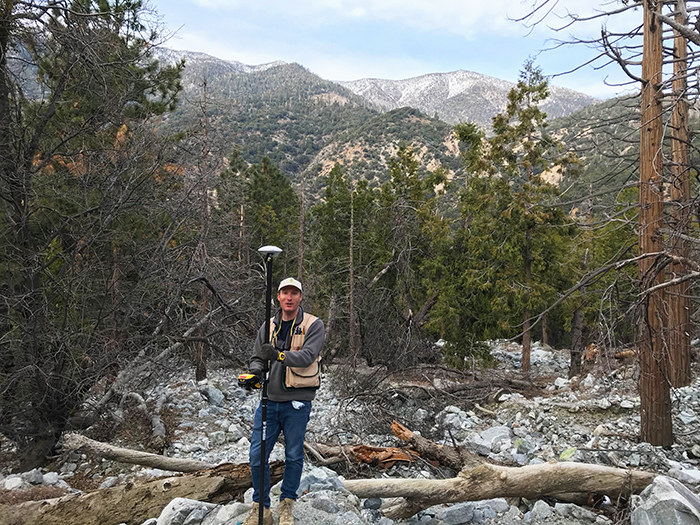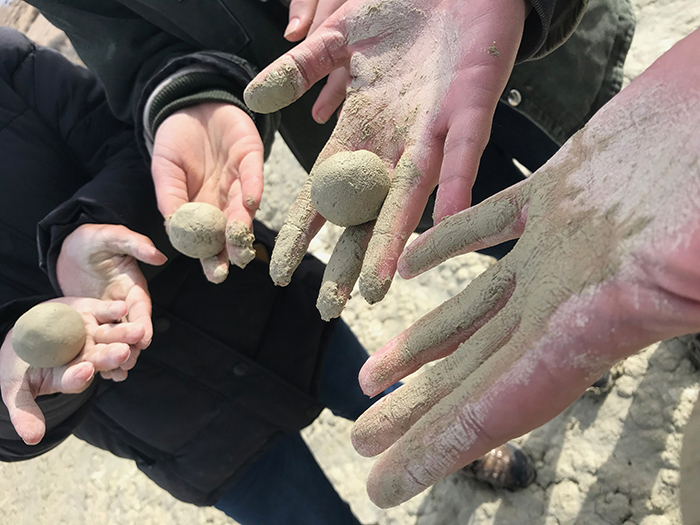Joe Gutierrez Office of Strategic Communication (909) 537-5007 joeg@csusb.edu

Identifying active earthquake fault zones and landslides. Studying the environmental impacts of mining. Mapping regions of rugged topography that may not be accessible on foot.
The next time Department of Geological Sciences students from Cal State San Bernardino head out to conduct field work like this they will be using industry-standard skills learned with advanced technology.
The department recently received a $275,000 grant from the W.M. Keck Foundation to support an undergraduate digital-mapping program that puts cutting-edge equipment directly in the hands of students.
The program will enrich students’ learning experiences by providing them with career-ready training; encouraging them to participate in other disciplines such as geology, engineering, geography, archeology, history, and art; and promoting increased engagement in their education.
“We are grateful to the W.M. Keck Foundation for its recognition of the amazing work of our faculty in our commitment to provide exceptional cutting-edge learning experiences to our students to help them succeed in the classroom, out in the field and after graduation,” said CSUSB Provost Shari McMahan.
Assistant professor Kerry Cato and professor Erik Melchiorre led the effort to secure the Keck grant.
“Students know the difference between being taught outdated skills with old instruments, and new skills learned with innovative technology.” Cato said. “Placing this technology in the hands of students says “We trust you,” and imparts a sense of belonging and personal value.”
The new instruments will also be used to establish a Digital Mapping Laboratory, and help faculty expand the research they conduct and publish. Digital mapping technology is particularly useful to study in regions of rugged topography and rugged vegetation that may not be easily accessible or visible to the eye.
Field work is the department’s signature strength. Over the past eight years, Melchiorre and his students have mapped and studied abandoned mine lands and environmental issues in the Mojave Desert. During a recent seven-day trip to the Desert Studies Center in Zzyzx, Calif., 12 students learned how to capture 3D imagery to assist environmental studies.
A video of the trip can be viewed on the “Geology students gain work experience” YouTube post.
“If all you do is learn out of a book or in a classroom, you’re not going to be ready for the workforce,” Melchiorre said. “You really need to get out in the field.”
The Keck grant comes on the heels of other recent department developments and highlights, including:
• A generous donor’s gift last year enabled the department to purchase LIDAR (Light Detection and Ranging) mapping equipment and drone technology.
• The department hosted its first-ever LIDAR training session in November for graduate students as well as researchers from UC Riverside and California State University, Fullerton.
• Adjunct professor and alumnus Bryan Castillo’s (MS, Earth and Environmental Sciences, ’19) research was recognized in December by the Office of Graduate Studies for breaking “new ground in the field of earthquake geology.”
More information about the department can be found on the Department of Geological Sciences webpage.
Based in Los Angeles, the W. M. Keck Foundation was established in 1954 by the late W. M. Keck, founder of the Superior Oil Company. The foundation’s grant making is focused primarily on pioneering efforts in the areas of medical research and science and engineering. The foundation also maintains a Southern California Grant Program that provides support for the Los Angeles community, with a special emphasis on children and youth. More information can be found on the W. M. Keck Foundation website.

